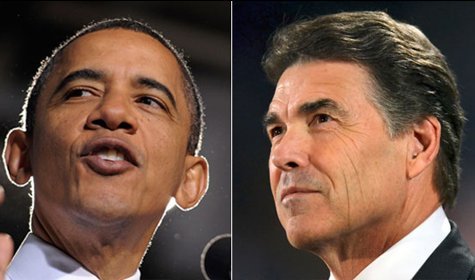DALLAS – Gov. Rick Perry today met with President Barack Obama to discuss the ongoing humanitarian and national security crises occurring along the Texas-Mexico border. In the meeting, Gov. Perry urged the president to undertake the necessary steps to secure the border and ease the crises.
“Five hundred miles south of here in the Rio Grande Valley there is a humanitarian crisis unfolding that has been created by bad public policy, in particular the failure to secure the border,” Gov. Perry said. “Securing the border is attainable, and the president needs to commit the resources necessary to get this done.”
Among the requests Gov. Perry made to President Obama to secure the border:
- Visit the Texas-Mexico border to witness firsthand the impact of the border crisis;
- Deploy an additional 1,000 National Guard troops to the Texas-Mexico border to immediately enhance border security operations;
- Direct the Federal Aviation Administration to allow the National Guard to utilize Predator drones along the Texas-Mexico border for identifying and tracking human and drug trafficking;
- Medically screen all illegal immigrants to ensure their health and the health of our citizens;
- Direct the Centers for Disease Control or another appropriate federal agency outside the Department of Homeland Security (DHS) to conduct, in conjunction with the Texas Department of State Health Services (DSHS), inspections of facilities in which illegal immigrants, including UACs, are being housed to ensure accepted international and national emergency sheltering standards are met;
- Modify or rescind policies that serve as a magnet to encourage illegal immigration, including:
- DHS Catch and Release policies by which DHS issues an illegal immigrant an NTA before an immigration judge and releases them. The U.S. Department of Justice reports that 33 percent of those released on their own recognizance failed to appear in FY 2013.
- Deportation policies and procedures that prohibit UACs from countries other than Mexico and Canada from being immediately repatriated back to their country of origin. After DHS processes these UACs, they are issued an NTA and delivered to a sponsor or relative in the United States, regardless of the relative’s immigration status.

